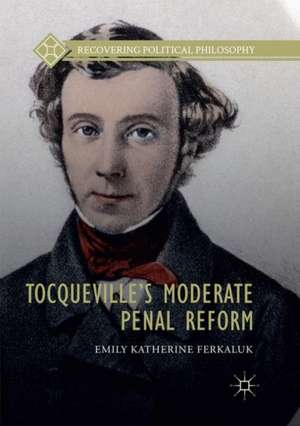Tocqueville’s Moderate Penal Reform: Recovering Political Philosophy
Autor Emily Katherine Ferkaluken Limba Engleză Paperback – 24 ian 2019
Din seria Recovering Political Philosophy
-
 Preț: 382.95 lei
Preț: 382.95 lei -
 Preț: 382.75 lei
Preț: 382.75 lei -
 Preț: 386.61 lei
Preț: 386.61 lei -
 Preț: 384.86 lei
Preț: 384.86 lei -
 Preț: 357.43 lei
Preț: 357.43 lei - 15%
 Preț: 702.24 lei
Preț: 702.24 lei - 18%
 Preț: 726.06 lei
Preț: 726.06 lei -
 Preț: 382.75 lei
Preț: 382.75 lei -
 Preț: 386.81 lei
Preț: 386.81 lei -
 Preț: 265.36 lei
Preț: 265.36 lei -
 Preț: 211.29 lei
Preț: 211.29 lei - 15%
 Preț: 646.75 lei
Preț: 646.75 lei - 18%
 Preț: 728.28 lei
Preț: 728.28 lei - 8%
 Preț: 487.94 lei
Preț: 487.94 lei - 15%
 Preț: 641.71 lei
Preț: 641.71 lei - 18%
 Preț: 786.98 lei
Preț: 786.98 lei -
 Preț: 201.06 lei
Preț: 201.06 lei -
 Preț: 214.57 lei
Preț: 214.57 lei - 15%
 Preț: 579.20 lei
Preț: 579.20 lei - 15%
 Preț: 577.07 lei
Preț: 577.07 lei - 15%
 Preț: 583.61 lei
Preț: 583.61 lei - 18%
 Preț: 777.20 lei
Preț: 777.20 lei - 15%
 Preț: 693.57 lei
Preț: 693.57 lei - 15%
 Preț: 698.30 lei
Preț: 698.30 lei - 18%
 Preț: 727.97 lei
Preț: 727.97 lei - 18%
 Preț: 786.18 lei
Preț: 786.18 lei -

Preț: 176.74 lei
Nou
Puncte Express: 265
Preț estimativ în valută:
33.82€ • 35.40$ • 28.15£
33.82€ • 35.40$ • 28.15£
Carte tipărită la comandă
Livrare economică 31 martie-14 aprilie
Preluare comenzi: 021 569.72.76
Specificații
ISBN-13: 9783030092696
ISBN-10: 3030092690
Pagini: 191
Ilustrații: XIV, 191 p.
Dimensiuni: 148 x 210 mm
Greutate: 0.25 kg
Ediția:Softcover reprint of the original 1st ed. 2018
Editura: Springer International Publishing
Colecția Palgrave Macmillan
Seria Recovering Political Philosophy
Locul publicării:Cham, Switzerland
ISBN-10: 3030092690
Pagini: 191
Ilustrații: XIV, 191 p.
Dimensiuni: 148 x 210 mm
Greutate: 0.25 kg
Ediția:Softcover reprint of the original 1st ed. 2018
Editura: Springer International Publishing
Colecția Palgrave Macmillan
Seria Recovering Political Philosophy
Locul publicării:Cham, Switzerland
Cuprins
1. An Introduction to Tocqueville’s First WorkChapter 1: Tocqueville's Moderate Penal Theory.- 2. Tocqueville’s Moderate Penal Theory.- 3. Tocqueville’s Moderate Penal Activity.- 4. Tocqueville’s Moderation and Lieber’s Idealism in Penal Reform.- 5. Tocqueville’s Moderate Penal Reform After 1832.- 6. Conclusion: Tocqueville’s Penal Reform and Today’s Penal Problems.
Recenzii
“Ferkaluk (Cedarville Univ.) offers an important new contribution to the ever-growing field of Tocqueville studies. … She discovers that Tocqueville’s political theory shines through the text in unexpected ways and that the book offers important lessons to contemporary liberal democracy. Summing Up: Highly recommended. Upper-division undergraduates through faculty.” (E. C. Sands, Choice, Vol. 56 (2), October, 2018)
Notă biografică
Emily Katherine Ferkaluk is Instructor of Political Science at Cedarville University, USA. She is translator of On the Penitentiary System in the United States and Its Application to France: The Complete Text and teaches courses in American politics and political theory.
Textul de pe ultima copertă
This book presents an interpretive analysis of the major themes and purpose of Alexis de Tocqueville’s and Gustave de Beaumont’s first work, On the Penitentiary System, thereby offering new insights into Tocqueville as a moderate liberal statesman. The book explores Tocqueville’s thinking on penitentiaries as the best possible solution to recidivism, his approach to colonial imperialism, and his arguments on moral reformation of prisoners through a close reading of Tocqueville’s first published text. The unifying political concept of all three discussions is Tocqueville’s underlying concern to pursue moderation between institutional and imaginative extremes in order to maintain liberal values. In both thinking moderately and advocating for moderate political action, Tocqueville’s On the Penitentiary System renews an emphasis on the importance of civic engagement and the balance between philosophy and praxis.
Caracteristici
Presents the first systematic, book length treatment of the meaning and purpose of Tocqueville’s first work, On the Penitentiary System in the United States and Its Application to France Makes the compelling argument that Tocqueville moderately approached French penal reform by appealing to a holistic view of human nature and by balancing the risks of alternative penal institutions Expands our understanding of Tocqueville’s political activity as a French statesman, his intellectual relationship to Francis Lieber, and our consideration of penal reform measures both past and present
